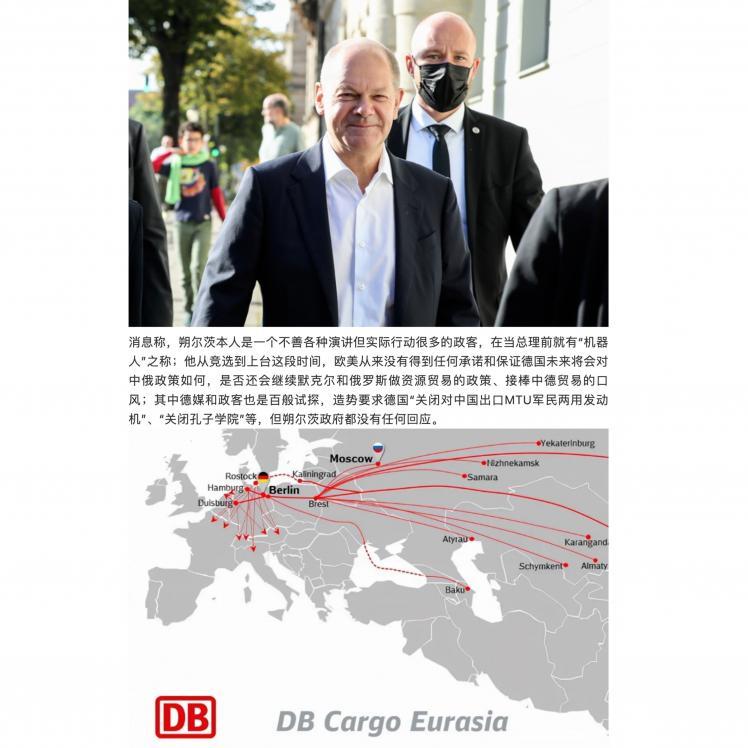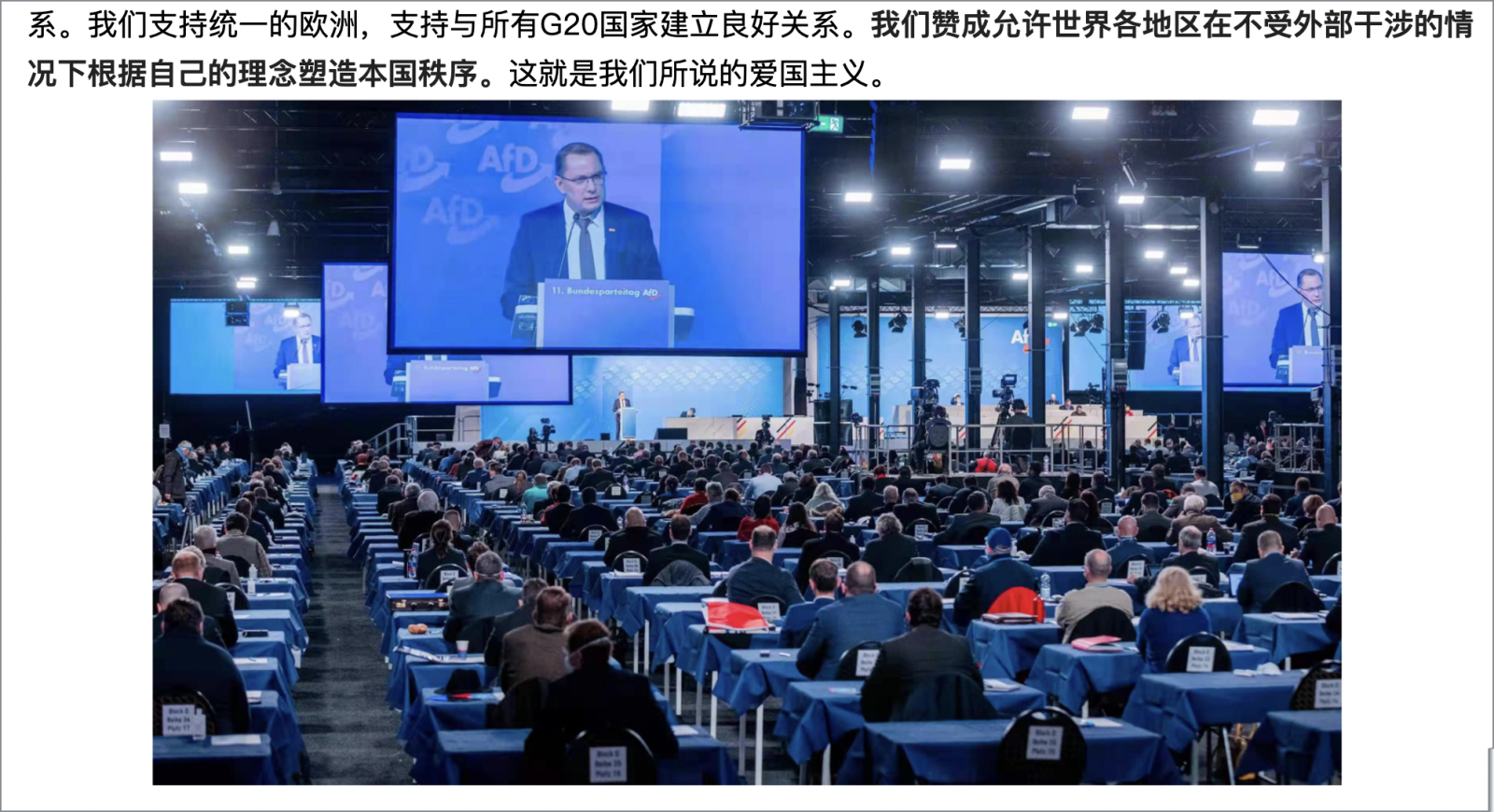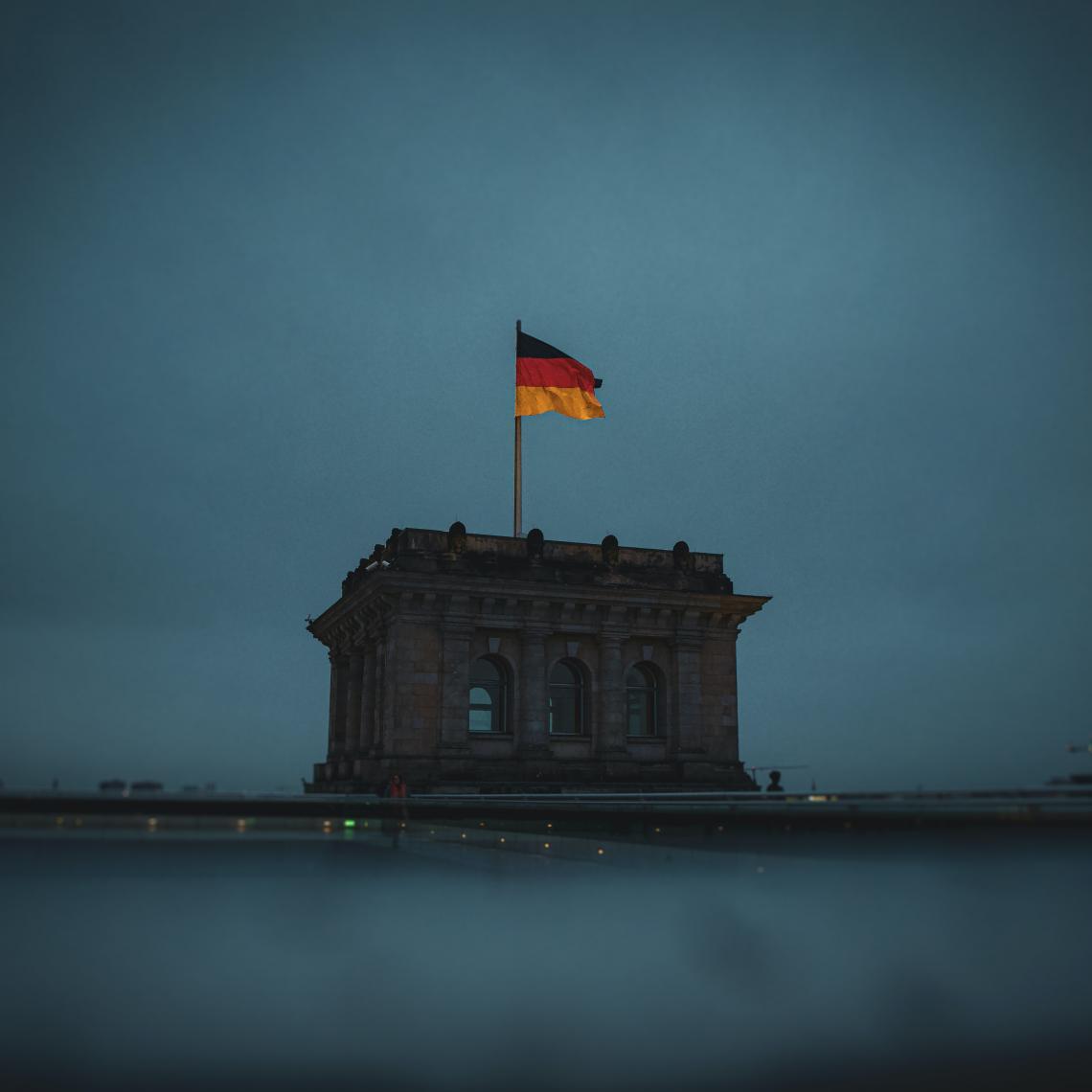
German national flag on the Berlin Reichstag. Image by Christian Lue, available from Unsplash under CC license.
Scholz the Partner, Baerbock the Rival, and Lindner the Competitor?
How is the China policy of the new German coalition government framed by the Chinese media?
Quick Takes
- Chinese commentators interpret contradictory signals from Germany as signs of fragmentation and dissension in a democratic system.
- The SPD is evaluated to be pro-China and Russia, with the new chancellor Olaf Scholz as the continuation of Angela Merkel’s or Gerhard Schröder’s foreign policy.
- The Greens and the FDP, on the other hand, are the troublemakers, especially the Greens are portrayed as extremists and agents of the USA.
- Because of so-called transediting technique and incentive of attention economy, numerous distortions seem to be shaping the picture of bilateral relations.
Since the outbreak of the Russian-Ukrainian war, the term information warfare has been on everyone’s lips. In particular, China’s media campaign has received international attention. NATO chief Jens Stoltenberg, for instance, accused China of “provid[ing] Russia with political support, including by spreading blatant lies and disinformation.”
However, what has been overlooked so far is the long tradition of China’s propaganda apparatus actively shaping its own narratives on international affairs. Furthermore, there is little awareness that internal Chinese logic underlies these narratives. This logic is based on mobilizing the Chinese population by shaping and controlling opinions, thus strengthening domestic nationalism.
After the new German government presented its coalition agreement on 24th November 2021, the frequent mention of China made international headlines. Within a few days, thousands of articles speculating on the China policy of the new federal German government flooded the Chinese virtual public.
The Echowall Project analyzed around 1,000 articles from Chinese websites, social networks, and traditional media from 24th November 2021 until 7th January 2022. The following analysis presents the prevailing narratives in China disseminated through these channels.
1. “The Destruction of Merkel’s Legacy”
On the Chinese internet, there was much talk of a “change in weather in Sino-German relations” shortly after the coalition agreement of the German government was announced. The first assessment of the coalition agreement appeared in Hong Kong’s daily South China Morning Post and was widely circulated. (The English version of SCMP is blocked in Mainland China, even though recent developments have given the impression that the newspaper is increasingly cooperating with Beijing).
In the overwhelming majority of articles published that day, authors stated that this was the “toughest” position yet on China by any German government. The frequent mentions of China and the explicit references to topics such as “human rights”, “Xinjiang”, and “Taiwan” are cited as evidence.
On the evening of the 25th of November, 2021, Zhao Lijian, spokesperson of the Chinese Foreign Ministry, commented at a regular press conference: “We hope the new German government can carry on China policies that are practical, [and] work with China in the same direction [...] I want to stress that issues related to Taiwan, Xinjiang and Hong Kong are all China’s internal affairs, bearing on China’s sovereignty and territorial integrity.” The cautionary tone of Zhao’s statement encouraged other writers to dramatize the new expected China policy of Germany’s coalition parties, commenting “Merkel’s legacy destroyed” and “sixteen years of effort down the drain.”
These affirmations show how strongly the Chinese public associates the bilateral relationship with the former chancellor. Merkel was officially regarded as a friend of China; she was said to have always taken the side against the US in conflicts between China and the US. (See here for a previous Echowall analysis on this topic: https://www.echo-wall.eu/china-and-world/off/cai-under-chinese-lens-win-win-whom)
Nevertheless, Merkel’s “initial mistakes” are still remembered - as a Global Times commentary wrote on 26th November 2021: “Merkel’s meeting with the Dalai Lama fourteen years ago once seriously jeopardized Sino-German relations. However, she later recognized China’s importance and started building a pragmatic relationship with China, influencing the China policy of the European Union […].”
The article expressed confidence that the “extreme views of the Greens” in the government were not a cause for concern and that stable relations were to be expected. The news article asserted: “When a new German government representative steps out of line, we do not need to be polite; instead, we need to fight courageously to establish authority and rules. Then, we can start the new bilateral relationship on the right foot and give the new German government the correct coordinates to understand China.”
Other observers, however, saw a risk of deteriorating relations: despite viewing Scholz as an advocate for China, they contended that the Greens were sabotaging his position. In their eyes, the fact that Scholz was heading a three-party coalition weakened his rank as the chancellor. Furthermore, they reminded the reader that the USA was still maintaining military bases in Germany.
Chinese opinion-makers interpreted contradictory signals from Germany as signs of fragmentation and dissension in the new coalition government. The politicians of the three ruling parties were portrayed so differently that it was reminiscent of the “divide and rule” (分而治之) strategy (see the book “Art of War” by Sunzi (孙子) that described this tactic 2000 years ago).
2. The Green Party and the Liberals as Troublemakers
All Chinese opinion leaders stressed that the two smaller parties of the coalition were responsible for the onset of “bad weather” in bilateral relations. Above all, the Greens were derided as “white leftists” (白左). This is an insult to Western actors who – according to the Chinese narrative – hypocritically campaign for social justice and human rights. In many articles, the Greens are also labelled as “extremists”. These derogatory labels follow a familiar pattern in the Chinese public to frame environmentalists. Unsurprisingly, several nationalist writers have further sharpened this narrative.
Nevertheless, it is noteworthy that the influential and respected business online medium Zhiguqushi (智谷趋势) also published an extensive tirade against the Greens. Addressing the Nordstream 2 gas pipeline debate, the author claimed that the German Greens were “fanatical like a cult when it comes to the environment” and that they would “prefer to let people freeze to death” in exchange for political correctness. The author further argued that the policies of the Green Party were in line with Nazi tradition, declaring that in the 1930s, a law for the protection of animals against animal cruelty, called the Reich Animal Protection Law, was introduced while “six million Jews were legally massacred”. Ultimately, the author predicted that only China could save Germany from freezing because China possessed vastly superior solar energy, wind energy, and transmission technologies.
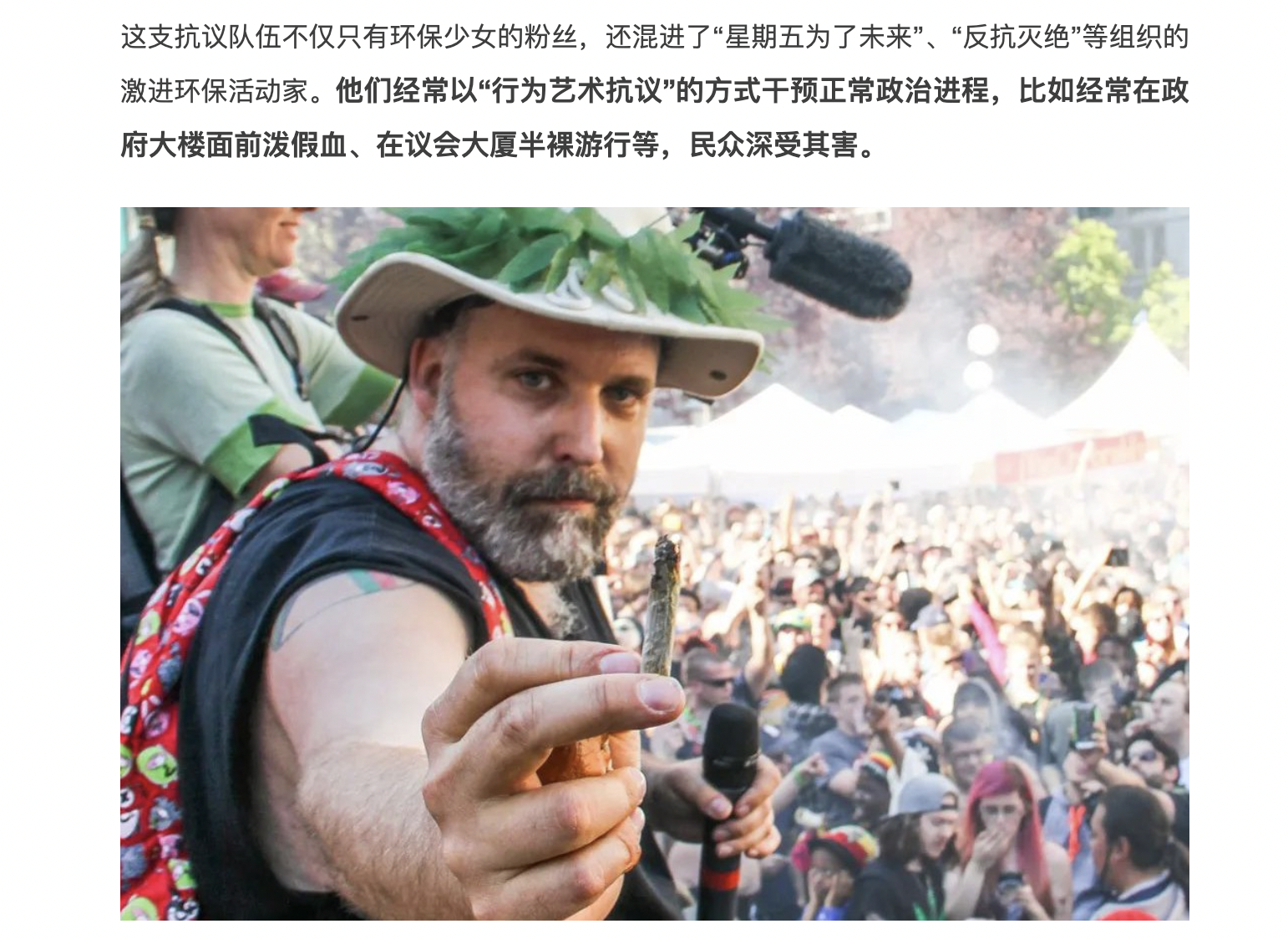
This image appeared in many articles relating to the Green party or environmentalism, in general, in the West. The Chinese text above reads: “This protest group consists of fans of the environmental girl [Greta], but also of radical environmental groups like Fridays for Future and Extinction Rebellion. They often disrupt the political process with “performance art protests”, such as using fake blood in front of government buildings and appearing half-naked in parliament. The population suffers substantially.”
Some Chinese commentators see the critical stance of the Greens on the subject of Nordstream 2 as evidence the German Greens are controlled by the USA. These authors proclaim that there was no rational explanation for the anti-Russian and anti-Chinese stance of the Green party. The Greens - an “insignificant party” - were merely relevant because of the support they received from the USA.
The derogatory statements are often explicitly directed at Germany’s foreign minister Annalena Baerbock, who “went to school in the USA” and supposedly recognized the “leadership of US diplomacy over German foreign policy.”
The People’s Daily mobile version shared an aggressive opinion piece by Jin Canrong, a famous professor of international relations at Renmin University. Jin mocked the German foreign minister for allegedly calling for a boycott of the Winter Olympics. “One does not want to destroy the grave of their ancestors (祖坟) with the Games,” he wrote in a way offensive to the Chinese, yet Baerbock exhibited this behavior because “the USA put her in charge”. Furthermore, Annalena Baerbock is often portrayed as naive. The influential online medium Guancha, for instance, claimed that the new foreign minister was inexperienced, merely amounting to a decorative “flower vase”.
It is striking that the mobile versions of state media tend to utilize a livelier and more vulgar tone than their print versions. According to the People’s Daily figures, their mobile app achieved 680 million subscribers in 2020.
Besides foreign minister Baerbock, Lindner from the FDP, minister of finance, was portrayed as similarly politically inexperienced so as to explain his party’s critical stance on China. Nonetheless, there were considerably fewer articles on the Liberals than on the Greens, and the opinion and evaluations of the FDP were far less clear-cut. All published articles emphasized that economic interests were the guiding principle of the FDP’s foreign policy. This type of portrayal is reminiscent of pragmatic politics, which has predominantly positive connotations in China. Many articles also cite Lindner’s preference for tailor-made suits and luxury cars.
The author Meng Hong, a researcher on Europe at Renmin University, expressed that the new German finance minister had “a talent for business”, citing the fact that Lindner recognized that a company he co-founded in 2000 was on the verge of bankruptcy and thus withdrew in time. The article continued that Lindner admired China’s economic policies and that at an FDP party conference in April 2019, the phrase “economic policy” was displayed in Chinese in the background. Even though Lindner called on Germany and Europe to “recognize the signs of the times and keep pace with China,” his attitude towards China had increasingly hardened in the last two years. However, the author fails to explain this development.
Semi-official media, though, allowed themselves to speculate about possible reasons. A Guancha commentator, for instance, stated that Lindner had an “unfortunate encounter” with China. In July 2019, Lindner, the FDP chairman, was invited by the foreign affairs department of mainland China. Nonetheless, Lindner chose to visit Hong Kong first and meet with opposition activists and demonstrators from the “Occupy Hong Kong” movement. After he arrived in Beijing, Lindner attempted to act as a mediator between the protestors and his Chinese hosts. Lindner’s visit to Hong Kong was heavily criticized in Beijing, and high-level meetings were subsequently cancelled. The author claimed that some Germans also criticized Lindner’s “inappropriate behavior.” Furthermore, the author expressed that Lindner viewed China as a competitor in every respect: regarding the political system, global value system, and economic model. Dramatically, this competition was not a race in which China was only trying to catch up with the West - it was a fight “to the death”.
3. The “male Merkel”
Journalists and authors on state media and most social networks backed Olaf Scholz, whom they evaluated as “the continuation of Angela Merkel’s or Gerhard Schröder’s foreign policy” and “the cornerstone of the new government’s diplomacy”.
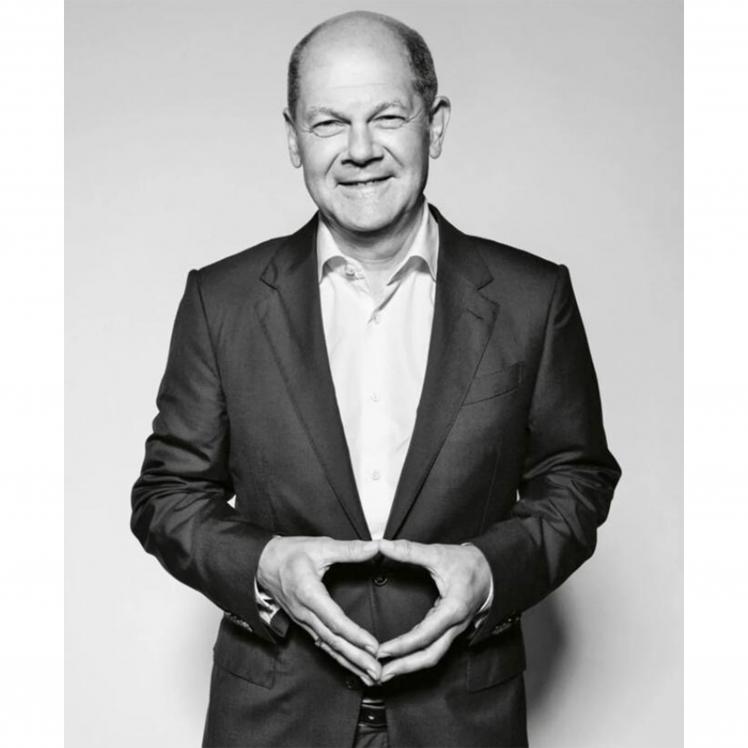
Screenshot of the Chinese publication Toutiao, in which Scholz presents himself with Merkel’s diamond-shaped hand gesture.
The Chinese opinion leaders portrayed Scholz as a pragmatist and even a “China fan.” The Global Times newspaper reported that Scholz had never expressed “anything aggressive” about China. The Xinmin Evening News observed that Scholz seldom mentioned China during the entire election campaign and that China hardly appeared in the SPD election manifesto. The newspaper emphasized that Olaf Scholz helped to shape the China policy of Merkel’s government and that he represented a sober and pragmatic line in German-Chinese cooperation. As the “male version” of his predecessor Angela Merkel, Scholz became a cliché in the international media. Chinese publications often adopted the image in which Scholz presented himself with Merkel’s signature diamond-shaped hand gesture.
Chinese media reported extensively on Scholz’s closeness to China and his positive attitude towards business. Many media outlets claimed that Scholz, as mayor of Hamburg in 2014, invited Chinese Premier Li Keqiang to visit the city: “We are dependent on China, and it is not an exaggeration to say that Hamburg is China’s capital in Europe.” The news portal Phoenix Weekly further reported on a visit to China by Scholz as the minister of finance in 2019. In a speech to students at Renmin University, Scholz reportedly emphasized that “the economies of China and Germany were interdependent”. According to Phoenix Weekly, Scholz also gave a German financial company access to the Chinese market during the course of that trip, for which the German media dubbed him a “peddler”. The Chinese article discreetly concealed that the company in question was the scandalous Wirecard, which has since been exposed as fraudulent.
At the beginning of December 2021, Chinese media presented definitive proof of Scholz’s China loyalty, claiming that he had administered a “soothing pill for the heart” (定心丸) to Chinese politicians. This “evidence” referred to international reports that Olaf Scholz had signaled to China’s President Xi Jinping the continuation of Angela Merkel’s China policy even before the conclusion of coalition negotiations. An EU diplomat told Wirtschaftswoche: “The EU Council President Charles Michel delivered the message to Xi on behalf of Scholz that he wants to maintain Merkel’s China policy.” Furthermore, Scholz promised his Chinese counterpart to “keep the two China-critical coalition partners in check.” The Chinese internet celebrated this long-awaited good news. There were also reports of a telephone conversation between President Xi Jinping and Olaf Scholz, in which Xi officially congratulated the new German chancellor. Scholz promised to “constructively promote the development of European-Chinese relations” and expressed his hope that “the investment agreement between the EU and China [could] enter into force as soon as possible.”
From that point on, almost all Chinese opinion-makers settled on one reading of the new German government: Olaf Scholz’s SPD was the guarantor of continuity in Germany’s China policy. Any initial disruptive maneuvers that were not received well in China were classified as moves by the SPD’s coalition partners - which Scholz would eventually be able to quell. At the end of December, foreign minister Baerbock expressed restraint on the question of a boycott of the Winter Olympics, which was promptly interpreted in China as the SPD having brought the minor coalition partner back in line.
The alleged disunity of the German government is gloated over by many writers, who cite it as proof that the Western democratic system is dysfunctional: “Apart from legalizing cannabis, the coalition government will not get anything done. Germans will miss Merkel in the cold.”
4. The Old German “Cadres”
In Chinese articles about the new German government, the name “Merkel” was mentioned significantly more often than that of any other German politician, including the incumbent chancellor Scholz. The strong presence of Merkel in Chinese discourse is related to China’s political culture: former party functionaries often still exert influence in the background, even if they are no longer holding official posts.
Therefore, it is also common to hear claims that the former chancellor, sometimes referred to as an “old cadre” (老领导), still pulls the strings in Germany’s China policy. Hence, Chinese authors constitute that Scholz’s commitment to continuity vis-à-vis China is steered by Merkel. Remarks that “Merkel bet on the right man” are also heard. Moreover, some writers conclude that China “correctly bet on Merkel”, who guaranteed her successor would accommodate China. One author states that Scholz is Merkel’s “mandarin”, hinting at Scholz’s previous position as the minister of finance in Merkel’s government while ignoring that the two belong to different parties.
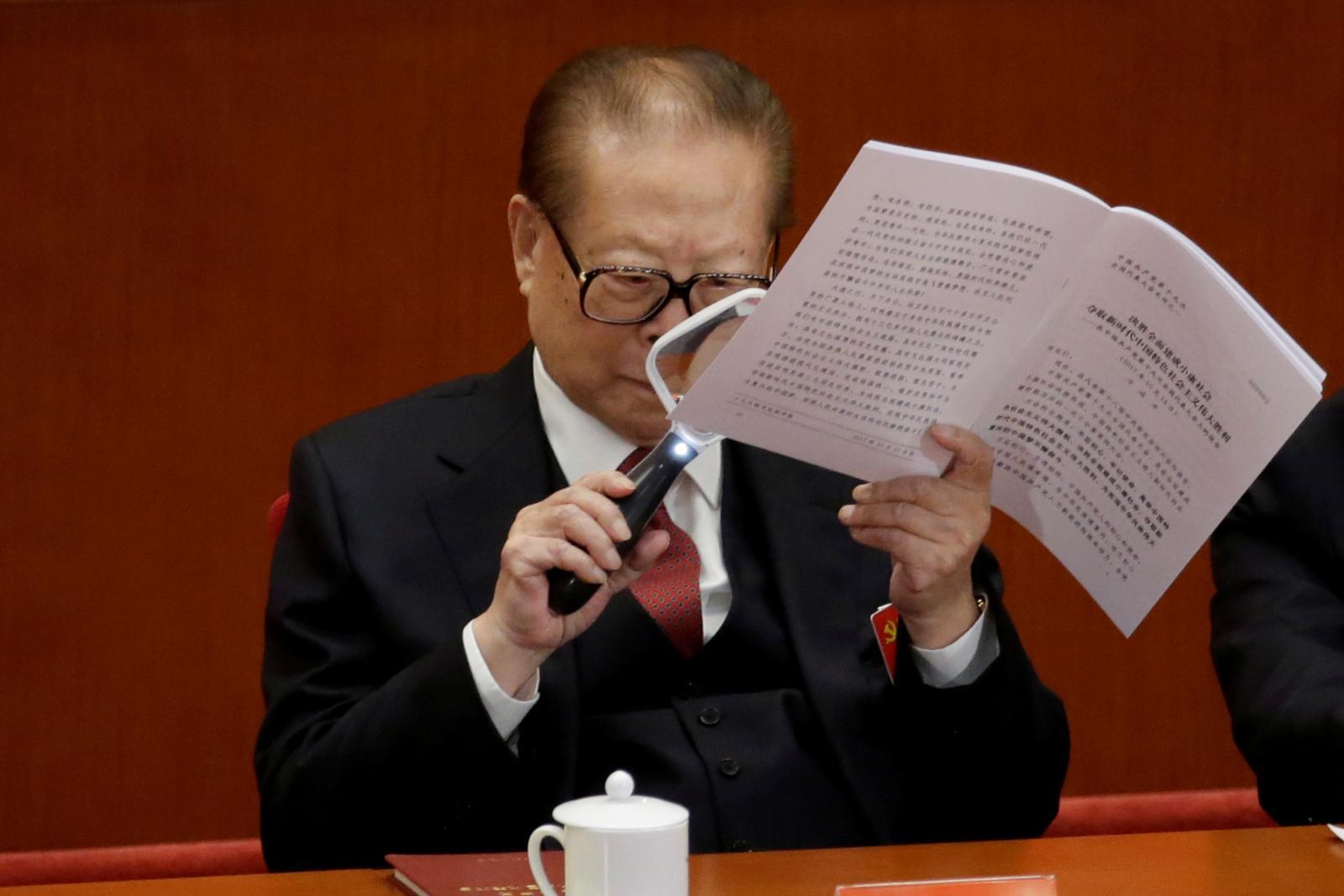
Jiang Zemin, China’s best-known “old cadre” at the People’s Congress in 2017 (Jason Lee / Reuters / TPG images).
The majority of these reports are based on a select few articles and interviews in Western media: for example, an interview with Angela Merkel in the Süddeutsche Zeitung on 22nd October 2021 or an article by the Reuters news agency on 27th November 2021.
The authors cherry-picked quotes that fit the narrative and interpreted them creatively: Merkel’s statement, in which she considered a complete decoupling from China to be harmful, is often reproduced and interpreted as criticism of the new German government; however, in the same interview, Merkel also confessed that there was perhaps too much naivety towards China (in regard to industrial espionage). This statement is entirely taken out of context by Chinese authors that claim Merkel was instead referring to her meeting with the Dalai Lama, which she now regrets.
An even older “cadre” - former SPD Chancellor Gerhard Schröder - is also brought into the conversation. Schröder has sharply criticized Annalena Baerbock’s position on China and Russia. The news article concludes that the SPD was the most China-friendly party in Germany, and assumes that Olaf Scholz also has this “gene” – after all, Scholz carried Schröder’s briefcase when Schröder was still chancellor.
Chinese media shines the spotlight on other “old cadres” of German parties that would likely object to any deviation from the previous course of bilateral relations with the new German government. In addition to former chancellor Merkel, former SPD politicians dominated most of the limelight. The former SPD chairman and defense minister, Rudolf Scharping, who runs a consulting firm for German companies doing business in China is particularly fond of being quoted.
Against this backdrop, Scharping’s agency regularly organizes a German-Chinese Business Conference with the China Economic Cooperation Center, a sub-organization of the International Department at the Central Committee of the Chinese Communist Party. Chinese media tend to upsell such formats as highly official and instrumentalize them for their own messaging. The German ex-defense minister, for example, is portrayed as a China defender against the new government. According to Reference News, Scharping stated that Germany needed China in all critical areas at his conference in late November. Moreover, he appealed to the EU in an interview with CCTV “to abandon the ‘logic of sanctions’ and restart the ratification of the China-EU Comprehensive Agreement on Investment (CAI)”.
It is difficult to assess whether China’s decision-makers actually believe in the old cadre narrative in Germany or only instrumentalize it to portray China critics in Germany as extreme, less relevant fringe figures to the Chinese public.
5. German Business as China’s Best Friend
In almost all articles, China’s opinion-makers try to create the impression that there are predominantly “reasonable” actors in German society who oppose a change of course in Germany’s China policy. German business representatives are distinctly keen on statements to substantiate how German politics and business are courting China. Herbert Diess, chairman of the board of Volkswagen, likely makes the most frequent guest appearance for this purpose. In December, Diess posted on his Sina Weibo account: “We need to cooperate more with China, not less. Decoupling from China would do great harm to Germany and the EU.”
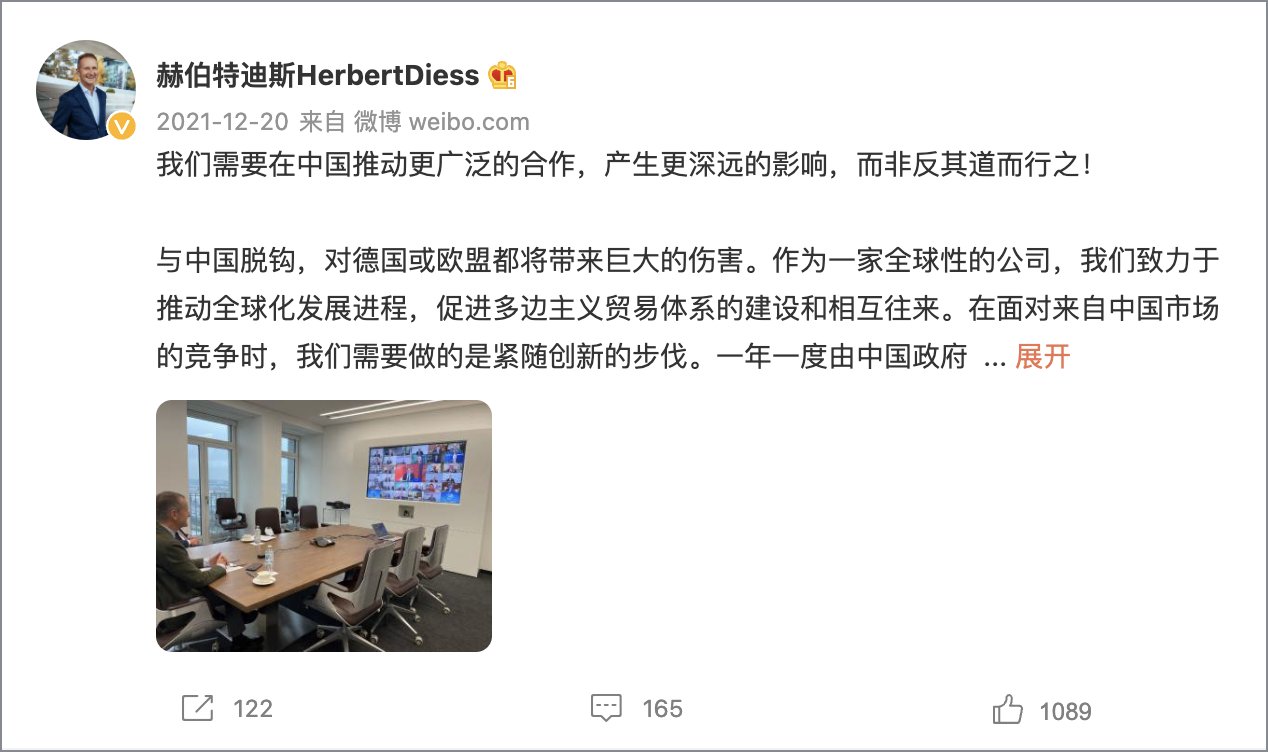
Screenshot – Herbert Diess’s Sina Weibo account.

